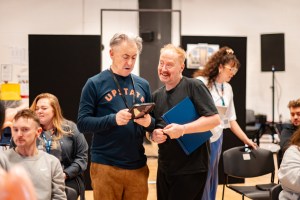Michael Coveney: Propeller in Norwich, Shogun in the Wells
It is fifteen years since the late Jill Fraser presented the first Propeller productions at the Watermill in Newbury, so it was touchingly appropriate that the first bursary awarded in her memory (supported by Cameron Mackintosh) should have been made after the opening of this year’s Propeller double-bill at the Theatre Royal, Norwich, on Friday night.
Director Edward Hall made a speech, and then Jill’s widower, James Sargant, now chairman of Propeller, formerly production controller at the RSC, presented the cheque for £5,000 to Tom White, a freelance lighting designer and electrician who has done the tour re-lights on this year’s shows, which are revivals of the 2006/7 versions of The Taming of the Shrew and Twelfth Night.
It was a lovely moment, not only in remembering Jill and her encouragement of the company – the first Propeller shows I saw were the fantastic, visceral productions of the Henry VI plays edited into “Rose Rage” at the Watermill in 2001 – but also in honouring the backstage world without which there is no show to start with. Tom White edged slightly shell-shocked into view, making it abundantly clear that he was far happier at the other end of the spotlight.
And he was given a rousing cheer by the all-male company and a lively crowd who included representatives of the Touring Partnership, the Arts Council, stray members of the audience, Theatre Royal boss Peter Wilson and sundry girlfriends and partners. “Is he going to spend the prize on more lighting equipment?” I asked Sargant. “Good god, I hope not. Perhaps he’ll take his family on a nice holiday…”
I hadn’t been to Norwich for at least ten years, so the amazing new Forum, home of Anglia Television and a huge city library, with shops and cafes, came as a complete surprise. It’s a lovely city, still, with its cathedral and churches and the arcades and Lanes, slightly more upmarket than their equivalent in Brighton or Leeds, say, but no worse for that.
Friday was one of those rare days when only nice things happen, starting with a chance encounter on the train from Liverpool Street with the artist Sara Willett, daughter of the late Helen Montagu, theatre producer extraordinaire, who was on a shopping mission with one of her oldest friends in the city. The two of them joined me for the second of the day’s shows, Twelfth Night, and the party after.
Actually, I’d preferred the first show, a brilliantly funny Shrew which had gone down a storm with a matinee crowd of schoolchildren relishing every crude sexual innuendo like a ship load of sailors on shore leave.
Twelfth Night really has to have a wonderful Viola, just as As You Like It has to have a wonderful Rosalind, characters you must fall in love with and (with all due respect to Adrian Lester’s magical Rosalind years ago for Cheek by Jowl) best played by women of sexual vibrancy and androgynous ambiguity.
That said, I don’t think Ed Hall shows any sign of running out of steam, or ideas, with Propeller. It may just be that the company, as constituted, is best suited to the histories and the more robust, less complex, of the comedies. Of course Shakespeare wrote these great women’s roles for boys to play, but when it comes to Viola, or Rosalind, or indeed Hermione and Paulina last year in The Winter’s Tale, you do feel: what’s the point of candlelight when you can have electricity?
That said again, I don’t think I’ve ever seen a better production of The Merchant of Venice than Propeller’s (and I include the Jonathan Miller one with Olivier and the Trevor Nunn version with Henry Goodman, both magnificent), and I loved The Shrew so much on Friday I sort of didn’t want it to end.
Interesting that, when the Globe did the play with an all-female cast (and a very fine one: Kathryn Hunter as Petruchio, Amanda Harris as Katherine) they didn’t come close to Propeller’s rambunctious swagger and joie de vivre; there was plenty of jokiness and horseplay, but it seemed slightly affected and “put on.”
Nothing “put on” about Anjin: The Shogun and the English Samurai at Sadler’s Wells, in which new RSC boss Gregory Doran recounts the astonishing story of the shipwrecked Protestant merchant William Adams who, in 1600, forged the first trade and foreign relationships with Japan while buffeted by the Samurai wars and Catholic missionaries.
I caught the Saturday matinee, really well attended, which shows what an appetite there is for the exotic and unusual in London theatre. It’s achingly beautiful to look at, unfashionably slow and long-winded. But is Mike Poulton’s narrative really Shakespearean, as Doran suggests?
There are some great battle scenes, a wonderful war horse (solid, rather than artfully sculpted, this one) and simply stunning costumes. But the language is flat and perfunctory, and there’s not much in the way of complexity in either the characters or the acting of a mixed Japanese and British cast.
One scene will remain with me, though, where the old Shogun tells a young boy that his warring family line must be extinguished and that he, the boy, must be beheaded. Does the boy understand this? He does. Does he accept his fate? Yes. Have you ever seen anything so touching and terrible? Not really.












